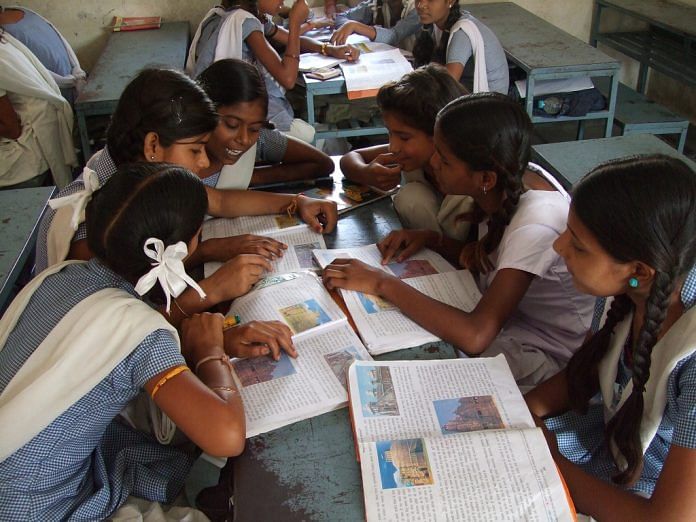New Delhi: The Narendra Modi government has revised the New Education Policy draft to exclude a provision that made Hindi lessons mandatory for school students in non-Hindi-speaking states as well.
The provision had kicked up a tremendous uproar in states such as Tamil Nadu and Karnataka, which criticised it as an attempt to force the language on them.
Eminent scientist K. Kasturirangan, the head of the committee that drafted the policy, confirmed the development to ThePrint.
“In the earlier draft, there was a certain paragraph about languages that gave a sense that we are trying to make Hindi compulsory for non-Hindi speaking states as well, which however was not the case, but the paragraph gave that sense,” he said. “We have replaced it with something that is more acceptable.”
Also read: Almost every Tamil Nadu leader is against Modi’s draft education policy over Hindi
Made public for comments on 31 May, the older draft read, “In keeping with the principle of flexibility, students who wish to change one of the three languages they are studying may do so in Grade 6, so long as the study of three languages by students in the Hindi-speaking states would continue to include Hindi and English and one of the modern Indian languages from other parts of India, while the study of languages by students in the non-Hindi-speaking states would include the regional language, Hindi and English.”
What the draft is referring to here is the three-language formula that has been followed since the adoption of the National Policy on Education 1968. The committee recommends that the formula, which south Indian states oppose over its perceived threat to regional identity, will continue.
The revised version says, “In keeping with the principle of flexibility, students who wish to change one or more of the three languages they are studying may do so in Grade 6 or Grade 7, so long as they are able to still demonstrate proficiency in three languages (one language at the literature level) in their modular Board Examinations some time during secondary school.”
‘No imposition of any language’
When the first draft kicked up a furore, the Ministry of Human Resource Development Saturday issued a statement saying “there will be no imposition of any language in educational institutions, nor discrimination against any language”.
The ministry also clarified that the document was a “draft policy submitted by the committee and is placed for views of the general public”.
“It is not the policy announced by government. After getting feedback from general public, and after consulting state governments, the National Education Policy will be finalised by government,” it added.
Also read: Modi govt panel wants school fees regulated, Indian languages given prominence




Yes very nice initiative, in Indian context the Masters courses should be more research oriented. Reputed like DU, JNU & BHU already started work in this direction, others to follow but we should try to task our PhD researchers to finish their research within a definite time frame.
A very nice initiative by GOI, Masters program should be more research oriented. Now a days, data is mostly available on various sources and enough aid is present both manually and technically. So integration of research and Masters program is very good.
Good news. But it is regrettable that such a draft was even prepared in the first place. For whatever it is worth, we the citizens will have to get proactive and loud in our protests against this government’s EVERY DESIGN to convert our beautiful and free thinking India, beautiful in its diversity AND RESPECT for diversity, into a narrow minded country. We want NEW INDIA of prosperity and opportunities for all, or at least an honest attempt in that direction. We don’t want a new India of HINDU DOMINATIION. Narendra Modi government cannot convert some of us into slaves of Hindus, or second class citizens compared to Hindus. We are, and will remain a free and SECULAR India.
It is evident in every word of Mr Modi’s speeches that he has a pressing urge to be recognized as a GREAT LEADER. He should realize it quickly that for that he will first have to be recognized as a GREAT HUMAN. His ambition is noble, but to achieve it he will have to desist from trying to become a “dreaded” leader. No one calls Stalin and Hitler great. And no one remembers them with love and respect, the emotions by which, from whatever I have been able to read about Mr Modi’s psychology, he will wish to be remembered. It is his bad luck that he is born amidst a geography which has a lot of people he does not like! It makes the task of fulfilling his ambition that much more challenging. But if he is still bent upon fulfilling it, of being called a GREAT LEADER, he will have to change himself, because he cannot change his geography and its demography!!
Not a day too soon. Tamils have been resisting the imposition of Hindi since the times of the British. Comrade Stalin spoke recently of Dravida Nadu. Great wisdom in respecting the diversity of India.